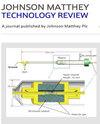层状袋状细胞内失效机制特征的x射线计算机断层扫描
IF 2
4区 化学
Q4 CHEMISTRY, PHYSICAL
引用次数: 1
摘要
锂离子电池(LIB)的安全性是一个多尺度问题:从整个电池结构到其复合内部三维微结构。需要大量的研究来标准化故障评估和优化电池设计,以降低LIB故障的风险。在这项工作中,研究了1 Ah层状袋状电池在100% SOC (4.2 V)下的失效响应,该电池具有市售的NMC阴极和石墨阳极。两种滥用方法的作用机制;机械(通过钉入)和热(通过加速量热法)通过使用一套死后分析方法进行比较。使用无创x射线计算机断层扫描分析了死后全细胞结构变化和电极层变形的两种机制。此外,电极表面,体微结构和颗粒形态的变化是通过以下提出的细胞拆卸和死后样品制备方法进行比较。基于对关键结构弱点、电极行为和颗粒裂纹的深入了解,证明了x射线计算机断层扫描作为LIB故障评估指南的可靠性。本文章由计算机程序翻译,如有差异,请以英文原文为准。
X-ray Computed Tomography for Failure Mechanism Characterisation within Layered Pouch Cells
Lithium-ion battery (LIB) safety is a multi-scale problem: from the whole-cell architecture to its composite internal 3D microstructures. Substantial research is required to standardise failure assessments and optimise cell designs to reduce the risks of LIB failure. In this work, the failure response of a 1 Ah layered pouch cell with a commercially available NMC cathode and graphite anode at 100 % SOC (4.2 V) is investigated. The mechanisms of two abuse methods; mechanical (by nail penetration) and thermal (by accelerating rate calorimetry) are compared by using a suite of post-mortem analysis methods. Post-mortem whole-cell architectural changes and electrode layer deformations were analysed for both mechanisms using non-invasive X-ray computed tomography. Furthermore, changes to electrode surfaces, bulk microstructures and particle morphologies are compared by following a proposed cell disassembly and post-mortem sample preparation methodology. Building on the insights into critical architectural weak points, electrode behaviours and particle cracks, the reliability of X-ray computed tomography as a guide for LIB failure assessment is demonstrated.
求助全文
通过发布文献求助,成功后即可免费获取论文全文。
去求助
来源期刊

Johnson Matthey Technology Review
CHEMISTRY, PHYSICAL-
CiteScore
4.30
自引率
4.30%
发文量
48
审稿时长
12 weeks
期刊介绍:
Johnson Matthey Technology Review publishes articles, reviews and short reports on science enabling cleaner air, good health and efficient use of natural resources. Areas of application and fundamental science will be considered in the fields of:Advanced materials[...]Catalysis[...][...]Characterisation[...]Electrochemistry[...]Emissions control[...]Fine and speciality chemicals[...]Historical[...]Industrial processes[...]Materials and metallurgy[...]Modelling[...]PGM and specialist metallurgy[...]Pharmaceutical and medical science[...]Surface chemistry and coatings[...]Sustainable technologies.
 求助内容:
求助内容: 应助结果提醒方式:
应助结果提醒方式:


